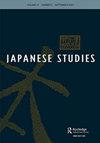Japan’s Peace Diplomacy on the Vietnam War and the 1968–1969 Shift in the United States’ Asia Policy
IF 0.4
Q3 AREA STUDIES
引用次数: 0
Abstract
ABSTRACT This article investigates the impact of the changing international environment in Asia at the turn of the 1960s on Japanese diplomacy regarding the Vietnam war and Southeast Asia. In 1968–1969, the United States announced important changes in its policy on the Vietnam problem and Asia, particularly the reduction of its military involvement in the region. Taking advantage of a US policy shift, China and the Soviet Union sought to expand their influence in Southeast Asia. Drawing on declassified diplomatic documents, this article shows that the government of Japanese Prime Minister Satō Eisaku, balancing domestic pressures and the need to preserve relations with Washington, adjusted its diplomacy in response to changes in the regional environment. While continuing efforts towards peace in Vietnam, Japan began work to shape a post-Vietnam Southeast Asian order based on peaceful coexistence between communist and non-communist countries. This was Japan’s strategy for countering the expected increase in Beijing and Moscow’s regional influence. Japan gradually acted to engage North Vietnam, a key actor to realize regional peaceful coexistence and a war settlement – which would in turn facilitate the realization of the reversion of Okinawa to Japan. This approach would be formalized in the 1977 Fukuda Doctrine.日本对越南战争的和平外交与美国1968-1969年亚洲政策的转变
摘要本文考察了20世纪60年代初亚洲国际环境的变化对日本在越南战争和东南亚问题上的外交影响。1968年至1969年,美国宣布在越南问题和亚洲问题上的政策发生重大变化,特别是减少对该地区的军事介入。中国和苏联利用美国政策的转变,试图扩大其在东南亚的影响力。根据解密的外交文件,这篇文章表明,日本首相卫佐的政府在平衡国内压力和维护与华盛顿关系的需要后,根据地区环境的变化调整了外交。在继续努力实现越南和平的同时,日本开始努力在共产主义和非共产主义国家和平共处的基础上建立后越南东南亚秩序。这是日本应对北京和莫斯科地区影响力预期增长的战略。日本逐渐采取行动,与北越接触,北越是实现地区和平共处和战争解决的关键角色,这反过来又将促进冲绳回归日本。这种方法将在1977年的福田学说中正式确立。
本文章由计算机程序翻译,如有差异,请以英文原文为准。
求助全文
约1分钟内获得全文
求助全文

 求助内容:
求助内容: 应助结果提醒方式:
应助结果提醒方式:


